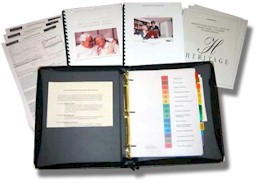Settling A Living Trust
I’m getting a lot of questions on how to settle a Living Trust. People want to know how complicated it is and do they have to get involved with attorneys and courts and all that. Well, the easy answer is...its pretty easy!
When the Trustor, the person who formed the Living Trust dies, if they are married, the spouse simply takes over as the sole Trustee and everything goes on as before until they die. The only exception is that the first deceased spouses half of the A-B Trust becomes irrevocable and at that point the remaining Trustee applies for a tax identification number for the deceased’s trust (very easy to do) and files a final tax return for the deceased. If the deceased spouse has any instructions about distribution of their assets to anyone other than the surviving spouse then the Trustee (surviving spouse) makes those distributions from the Trust.
I recommend that the surviving Trustee open a bank trust account with themselves as the Trustee of the account and place into it any assets of the deceased that are in the Trust. The Successor Trustee must follow any and all of the deceased’s instructions in the Trust to the letter...even if it was a spouse. Changes CANNOT be made by a spouse or any Trustee after the death of the Trustor.
If the deceased Trustor was single and the Trustee duties pass to a grown child, for example, the Successor Trustee should follow the same instructions as above, following the deceased’s wishes and instructions precisely...it is against the law to do anything else. Instructions may include situations where money is to remain in the Trust for years and be distributed under certain conditions or at certain times...this is a common situation and the Successor Trustee is charged with the fiduciary duty to follow those instructions.
An attorney is not needed except for the possibility of probating any assets left out of the Trust and the preparation of Deeds to transfer property to the beneficiaries. The attorney involvement should be minimal. You will need an accountant to file the final tax return for the deceased.
If the Trust contains instructions to keep investments in the Trust and pay earnings from those investments out to beneficiaries over time, you may need to file a 1041 tax return annually to account for the income to the trust from those investments.
When all of the instructions of the deceased have been followed and all the assets in the Trust have been distributed leaving nothing in the Trust, the Trust terminates. An A-B Trust for married couples is usually what we call a “Loving Trust”...that is, when the first spouse dies everything goes to the surviving spouse and when the 2nd spouse dies everything is divided up among the children. In these cases the first to die is considered the B Trust and it terminates when all the instructions have been followed and the deceased spouses half of the assets is distributed to the beneficiaries he or she designated. The A Trust then continues on until the surviving spouse dies. Remember though, the surviving spouse cannot change any of the instructions left by the deceased spouse pertaining to their half of the combined estate.
In estates with very large assets, the QTIP provisions come into play for the surviving spouse but that is a subject for another time.
It is vitally important that all assets be funded into the Living Trust at the beginning of the Trust to avoid Probate, and that the Trustors live out of the Trust...titling any new assets into the name of the Trust from the beginning of their ownership. When this is done it makes settlement of the Trust very simple and it can be accomplished quickly and efficiently...usually within a few weeks.
If you have questions send them to me by email and we will address them on the blog. If you would like to consult regarding a trust for your family you can call Heritage at 888-437-8778.
 Post a Comment → Posted on
Post a Comment → Posted on  Friday, September 21, 2012 at 03:07PM
Friday, September 21, 2012 at 03:07PM 
